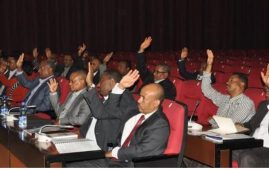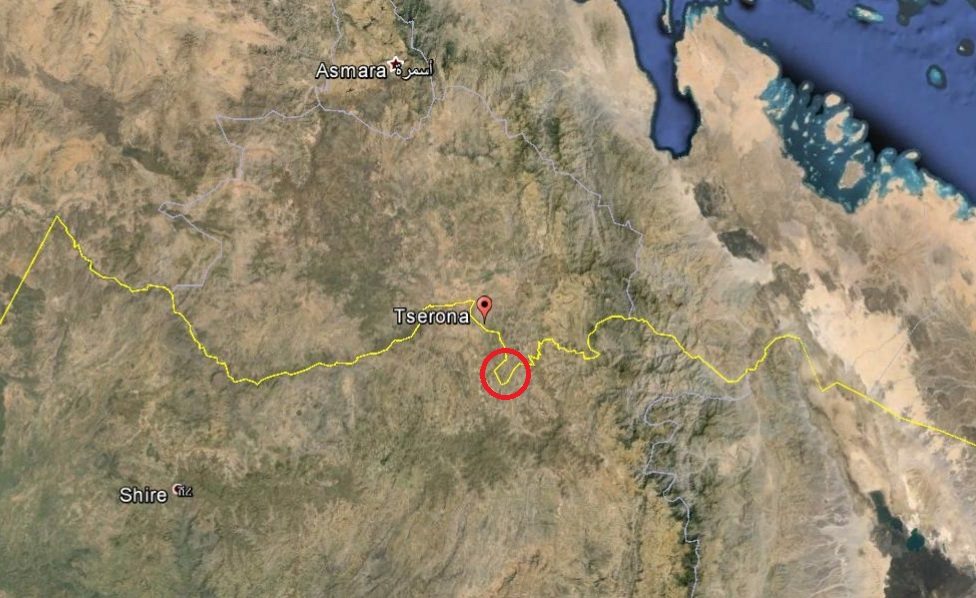Eritrea calls for yet another ‘independent investigation’
[From: A Week in the Horn of Africa – Nov. 25, 2011 issue]
Eritrea’s Foreign Minister has written a letter to the UN Security Council protesting what he claimed were "serious and unfounded accusations." He was, of course, referring to the claim that Eritrea has recently delivered three plane loads of arms to Al-Shabaab in Baidoa. The Foreign Minister laments over what his government sees as Kenya’s failure to respond "positively to the Eritrean gesture" to reassure Kenya that the claims "were utterly baseless and pure fabrication." There is, of course, nothing surprising about Eritrea’s protestations of innocence, but it is not entirely clear if indeed the Minister was serious about his efforts to "reassure" the Kenyans of Eritrea’s innocence. As we mentioned last week, the Eritrean regime’s Ambassador to Kenya confined himself to making all kinds of accusations against Ethiopia rather than addressing the matter directly.
What is more surprising in the Foreign Minister’s letter to the UN Security Council is the request that the UN Security Council make "an independent and impartial investigation into the matter." For good measure the letter adds that "if the investigation determines that there is no basis whatsoever to the very serious and harmful accusations by the Government of Kenya" the UN Security Council should "take action that would redress the injustice suffered by the people and Government of Eritrea." He even goes so far as to call Kenya’s claim a "defamation of a UN member state" that should not be "indulged in with impunity", given "its negative implications for regional peace and stability."
There are some issues we would like to raise here. Eritrea is calling for an "independent investigation" into a matter the outcome of which the regime has already prejudged to be in its own favor. This is unexpected coming as it does from a regime which has consistently proved to be impervious to any and all criticisms against it. If independent investigations and their outcome were in fact palatable to the regime, it would have long ago accepted the UN Monitoring Group’s report and made a long overdue effort to mend its ways. So it is not entirely clear what sort of “independent investigation" the Eritrean Government is calling on the Security Council to establish or what sort of findings Eritrea would accept. The truth of the matter is that Eritrea is not prepared to listen to anything except monologues in its support.
The second point concerns the Minister’s call for the "redress of the injustice suffered by the people and government of Eritrea" as a result of Kenya’s “defamation”. For a regime that has for over a decade and a half been involved in countless acts of destabilization to complain about being called by appropriate names as some kind of injustice is pure nonsense. A claim can only be considered as act of defamation if it isn’t true. That’s actually beside the point. What the Eritrean Foreign Minister is trying to do is to play the underdog card once again and portray Eritrea as the victim of a concerted campaign by the international community. The Minister warns in his letter that the international community’s failure to redress this "injustice” will have "negative implications for regional peace and security." This implied threat is rather closer to the truth about the regime’s behaviour than its call for any "independent investigation" or its claims of “injustice." As before, Eritrea is clinging to its claims of innocence, despite the mountains of evidence to the contrary. By calling on the Security Council to conduct yet another investigation and making hysterical claims of suffering injustice the regime is repeating its old trick of trying to deflect the international community’s attention away from the attempted chaos that is being authored and engineered by the regime.
**************
You may also read an article by Reuters’s Aaron Maasho: Analysis-Eritrea set to avoid harsh sanctions, still mistrusted (Nov. 18, 2011) that quotes a Western envoy to the U.N. Security Council as saying: ‘It’s not that we approve of the Eritrean government, but we don’t think sanctions that would hit the Eritrean people would be very helpful….Sanctioning the mining industry and remittances would hurt the Eritrean people far more than the government’.
The article also quotes David Shinn, a former U.S. ambassador to Ethiopia, remarking that China and Russia among others were likely to push for a watered-down resolution.
Both China and Russia typically oppose sanctions on African nations, a position that left China in particular in a bind. "While it has cordial relations with Eritrea and opposes sanctions, it has much more important ties with Ethiopia," Shinn told Reuters. "Something will probably come out of the United Nations Security Council, but I believe it will be fairly mild." Read the full article here (link).
******
Check the Eritrea archive and Eritrean terrorism archive for related posts.






You should take part in a contest for one of the greatest blogs on the internet.
I’m going to recommend this web site!